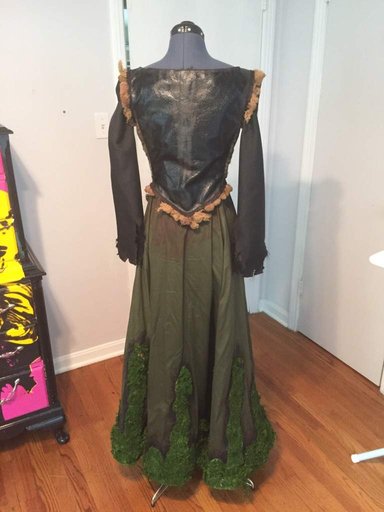

With the thrust stage and the high-backed wooden throne occupying its far end, he keeps things focused on the action. It’s so attenuated that it feels as if it’s about to continue into tomorrow and then into the tomorrow after that.Īs Doyle often does, he functions as set designer. He falters on his delivery of Macbeth’s “tomorrow and tomorrow and tomorrow” speech. He’s lying on the ground (Doyle must want him there) and/or holding his head in his hands. There are sequences when he does raise his voice, but too often he’s less than the accomplished warrior.
#Macbeth witches costumes full
He seems to be portraying Macbeth as too full of 100% fat-free milk to bite into the role with conviction. It’s as if he looked at the dialogue where Lady Macbeth tells him he’s “too full o’ th’ milk of human kindness” and decided she’s right. A reliable actor, whom Woody Allen chose to play the celebrated macho Ernest Hemingway in Midnight in Paris, Stoll is surprisingly less reliable here. Which leads to Stoll as the Scottish play’s title character. The encounter is rough and tumble and entirely believable.

Thanks go to fight director Thomas Schall for his handling of the knife-play when Macbeth (Corey Stoll) engages with Macduff and learns his foe is not of woman born and therefore the nemesis over whom, if the witches are to be heeded, he can’t prevail. His grief when learning his wife and children have been slaughtered is extremely moving, particularly his reading of the words “all my pretty ones.” Mary Beth Peil is a regal King Duncan, and as Malcolm, Raffi Barsoumian delivers the closing speech with appealing dignity. There are several performances that work at various moments, the most rewarding coming from Barzin Akhavan as Macduff. She insists that “a little water will wash away the evidence of our guilt,” but that she’s so very wrong about it is nicely foreshadowed. Directly after she’s returned from planting knives on King Duncan’s slain attendants to incriminate them, she sits in full view of the audience washing her bloodied hands-and not cleaning them sufficiently. She’s completely convincing during her “unsex me now” plea and just as persuasive when it comes time to address that recalcitrant “damned spot.”Īnd Doyle has her do something earlier that is quite clever. As Lady Macbeth, Nadia Bowers is strong as the husband-baiting spouse. There are, however, several innovations in Doyle’s Macbeth that deserve praise before getting into production aspects that are less praise-worthy. Those of us for whom this is our third or seventh or umpteenth Macbeth know what’s going on, but what about a ticket buyer who has never seen the play or has learned something of it and may even be looking forward to the witchy trio they’ve heard about? This get-go isn’t a good omen. Which three? It’s an idea, all right, but not an edifying one. So it doesn’t take too much imagination to conjure directors scratching their heads for a new way to treat the weird sisters.ĭoyle sends out eight of the nine cast members to stand, four each, on either side of his long thrust stage to recite the opening lines starting with, “When shall we three meet again?” What? Eight people talking as if they were three. So it’s difficult to chastise John Doyle for how he introduces The Tragedy of Macbeth, which he’s redlined to 90 intermissionless minutes and simply calls it, as many understandably have before him, Macbeth.Īs every Macbeth advocate throughout the past 400-plus years has been aware, the tragedy begins with three witches muttering over a boiling cauldron. So many hundreds (thousands?) of directors have already plumbed the texts for a new approach that discovering something fresh is a forbidding task. To some extent you can’t really blame a director about to stage a William Shakespeare play for not getting everything right, especially a director about to tackle one of the best known works.


 0 kommentar(er)
0 kommentar(er)
